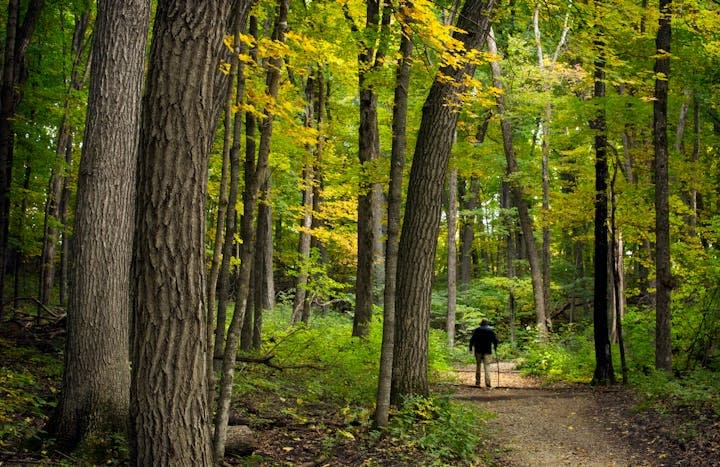Rice County approves gravel mine near Nerstrand Big Woods State Park despite residents' environmental concerns

A group of Rice County residents is frustrated after their efforts to stop — or at least delay — the county's issuance of a gravel mine permit were rebuffed.
The Rice County Board voted 4-1 last week to issue a gravel mine permit in an area of Northfield Township that some residents say is environmentally sensitive — and should be regarded as part of a broader swath of preserved land they refer to as the "Big Woods Corridor."
Some residents of the area southeast of the city of Northfield are concerned about the Milestone Materials mine's impact on groundwater, a local creek and wildlife and plants in the area. Others object to dust or the surge in truck trips anticipated when mining occurs on the 12- to 14-acre site.
Anyone who understands "how watersheds work and knows anything about larger conservation efforts in this area, I think, would know this is not the right place for an aggregate pit," said Kiara Jorgenson, a St. Olaf College religion and environmental studies professor who lives about a mile from the mine property.
The Rice County Planning Commission recommended approving the mining permit in May.
Residents who banded together to voice their opposition had also hoped the project would undergo an environmental assessment. More than 100 residents had petitioned the state for the brief environmental review, which wasn't initially required by state law. The state volleyed the decision back to the county, which voted to deny such a review.
Julie Runkel, the county's environmental services director, said Rice County "followed the process outlined in county ordinances and state statutes" and went "a step or two further" in responding to the resident group's concerns by holding a second public hearing and requesting a review from Bolton and Menk, an engineering firm offering environmental planning services. The parcel is locating in an area zoned for agriculture and mining is allowed there as an interim use, she said.
The Bolton and Menk review "identified no significant environmental impacts that cannot be addressed through standard permitting processes."
Conditions placed on the five-year permit — there are 26 total — include creating a buffer along Prairie Creek, the body of water flowing through the mining site, that is wider than the state requires, Runkel said.
Both the county and the mine's supporters note that it will meet needs for gravel for construction projects in the county and nearby. They say locally available aggregate reduces the environmental impact, time and cost of transporting the materials from farther away.
Jorgenson said she's seen no evidence that the county is short on aggregate or that mining this spot is necessary.
Rice County Commissioner Galen Malecha, who cast the the lone vote against the denial of the environmental review and the permit, noted that the mining site isn't far from Nerstrand Big Woods State Park, itself one of the "last extensive stands of the Big Woods" in Minnesota, according to the Minnesota Department of Natural Resources. The Big Woods were a forest area once covering thousands of square miles in south-central Minnesota and western Wisconsin.
It's close to a University of Minnesota natural research area, two wildlife management areas overseen by the DNR and many acres of land put into conservation easements by families and a local nonprofit, he said.
"We only have one Earth … and we've been abusing our natural resources for years," Malecha said. "I'm a firm believer that we need to do all we can to protect what we have."
Andrew Peters, a geologist with Wisconsin-based Milestone Materials, said the company had no comment on the permit or the project.
A "special" place
At a Rice County Board meeting held last week, more than two dozen people shared their thoughts on the proposed mine project, most of them opposed.
But some spoke in favor. Bill Holmblad, owner of Hillside Excavating, predicted that truck traffic would be less significant than some feared. He said nearby residents would see property values increase due to the mine.
"You're not going to see anything — you're just going to see a lake develop," Holmblad said, adding the much of the mining will be underwater.
In an interview, Erik Sahlin, who lives 8 miles from the mine site, said he thinks the county should have done more to alert residents of the potential project. He called the area "a very special part of Rice County" and worries the permit could open the door for additional mining nearby or the construction of an asphalt plant on site.
Runkel didn't answer a question posed over email about whether an asphalt plant had been discussed. Malecha said there were no official plans for a plant. That could change, he said.
Malecha said he tried to make one of the permit's conditions — creating a berm with a 300-foot setback to separate the mine and creek — more stringent, but "none of the commissioners would go for that."
"They were more concerned that the mining company get every ounce of gravel," he said.
Rice County commissioners debated specifics of the permit's conditions at length. They made one amendment, related to mining on Saturdays.
Commissioner Gerry Hoisington said he believed the board gave "ample opportunity" for public comment and that the process was transparent.
"There's no hidden agendas anywhere, and I think this is what good county government should be," he said.

